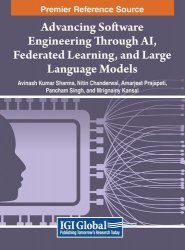Advancing Software Engineering Through AI, Federated Learning, and Large Language Models
- Добавил: literator
- Дата: 23-05-2024, 19:06
- Комментариев: 0
 Название: Advancing Software Engineering Through AI, Federated Learning, and Large Language Models
Название: Advancing Software Engineering Through AI, Federated Learning, and Large Language ModelsАвтор: Avinash Kumar Sharma, Nitin Chanderwal, Amarjeet Prajapati, Pancham Singh
Издательство: IGI Global
Год: 2024
Страниц: 375
Язык: английский
Формат: pdf (true), epub
Размер: 29.2 MB
The rapid evolution of software engineering demands innovative approaches to meet the growing complexity and scale of modern software systems. Traditional methods often need help to keep pace with the demands for efficiency, reliability, and scalability. Manual development, testing, and maintenance processes are time-consuming and error-prone, leading to delays and increased costs. Additionally, integrating new technologies, such as AI, ML, Federated Learning, and Large Language Models (LLM), presents unique challenges in terms of implementation and ethical considerations. Advancing Software Engineering Through AI, Federated Learning, and Large Language Models provides a compelling solution by comprehensively exploring how AI, ML, Federated Learning, and LLM intersect with software engineering. By presenting real-world case studies, practical examples, and implementation guidelines, the book ensures that readers can readily apply these concepts in their software engineering projects. Researchers, academicians, practitioners, industrialists, and students will benefit from the interdisciplinary insights provided by experts in AI, ML, software engineering, and ethics.
The Chapter 1 investigates the transformative intersection of Artificial Intelligence (AI), Machine Learning (ML), Federated Learning, and large language models (LLM) within the realm of Software Engineering. The study contextualizes the historical evolution of these technologies, highlighting pivotal milestones that have shaped their integration into the fabric of software development. The primary objective is to provide a comprehensive overview of how AI, ML, Federated Learning, and LLM are revolutionizing Software Engineering practices. The research employs a multifaceted methodology comprising literature reviews, case studies, and real-world examples to analyze the impact of these technologies. Key findings include substantial improvements in development efficiency, enhanced collaboration, and the adaptive nature of software solutions. The proposed methodology emphasizes interdisciplinary collaboration, ethical considerations, practical implementation guidance, scalability strategies, and a continuous feedback loop.
Machine Learning is becoming increasingly popular in software engineering due of its capabilities. By studying and learning from data using algorithms, software systems may improve their performance and adapt to new conditions without having to explicitly programme. Software engineers may use Machine Learning to build systems that learn and adapt over time, resulting in more effective and efficient issue solutions. Software engineering uses Machine Learning in a variety of ways, such as recommendation systems, natural language processing, video and image analysis, and predictive modelling. Machine Learning is likely to have a significant impact on how software is built and used across industries as it becomes more widely used. The application of Machine Learning in software engineering has the potential to transform how software systems are created and utilised. Machine Learning allows systems to learn and adapt to changing data and settings, resulting in more efficient and effective solutions to a variety of problems.
Contents:
Скачать Advancing Software Engineering Through AI, Federated Learning, and Large Language Models
Внимание
Уважаемый посетитель, Вы зашли на сайт как незарегистрированный пользователь.
Мы рекомендуем Вам зарегистрироваться либо войти на сайт под своим именем.
Уважаемый посетитель, Вы зашли на сайт как незарегистрированный пользователь.
Мы рекомендуем Вам зарегистрироваться либо войти на сайт под своим именем.
Информация
Посетители, находящиеся в группе Гости, не могут оставлять комментарии к данной публикации.
Посетители, находящиеся в группе Гости, не могут оставлять комментарии к данной публикации.

